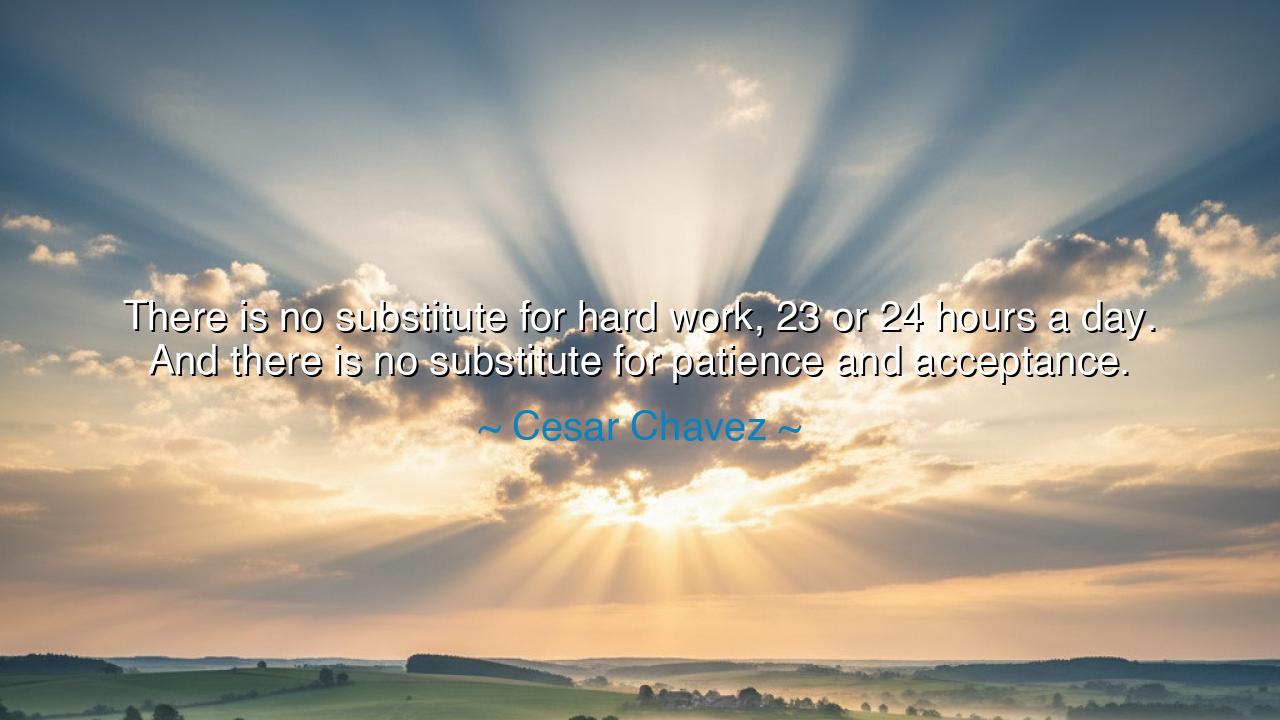
There is no substitute for hard work, 23 or 24 hours a day. And
There is no substitute for hard work, 23 or 24 hours a day. And there is no substitute for patience and acceptance.






Hear the words of César Chávez, a champion of the forgotten laborer, who declared: “There is no substitute for hard work, 23 or 24 hours a day. And there is no substitute for patience and acceptance.” These words rise not from ease or comfort, but from the fields where the sun scorched and the soil tore at the hands of farmworkers. They are not the proud boast of a man untouched by struggle, but the wisdom of one who bore it, endured it, and turned endurance into victory. For Chávez knew that while dreams ignite the soul, it is hard work, coupled with the quiet strength of patience and the humility of acceptance, that turns vision into reality.
The ancients, too, revered this law. The farmer who tilled the land could not conjure a harvest by wishing. He rose before dawn, worked by the sweat of his brow, and trusted the slow unfolding of the seasons. The soldier who trained in the dust did not become mighty by a single battle, but by endless drills, hardships, and wounds endured with patience. The philosopher did not ascend to wisdom in a single night of study, but by years of contemplation, enduring doubt, and accepting the limits of human knowledge. Thus, Chávez stands among these timeless voices, reminding us that there are no shortcuts to greatness—only the long, narrow path of labor and endurance.
The story of Chávez himself is the story of this truth. Born into a life of toil, he worked the fields as a boy, bent beneath the same burdens as those he would one day lead. He organized not with sudden brilliance, but with years of tireless marches, fasts, and conversations under the hot California sun. For every victory won by the United Farm Workers, there were countless unseen hours of sacrifice. Chávez lived the truth of his words: that hard work must be ceaseless, that patience must endure insult and rejection, and that acceptance must steady the spirit when the world seems unyielding.
Yet in his wisdom, Chávez added something greater. For he knew that hard work alone is not enough; it must be married to patience and acceptance. The impatient worker burns out, consumed by anger when change does not come swiftly. The one who refuses acceptance grows bitter, unable to endure setbacks. But the one who works with steady labor, who accepts hardship as part of the struggle, who waits with patience while continuing the fight—that one cannot be broken. Such a person becomes like the mountain, unmoved by storms, rising through generations.
History mirrors this law beyond Chávez. Think of Mahatma Gandhi, who embraced hard work in the form of marches, fasts, and relentless organization, but who paired it with patience and acceptance, enduring prison, mockery, and delay without abandoning his cause. Think of Nelson Mandela, who spent twenty-seven years in prison yet emerged with spirit unbroken, his acceptance of suffering transforming him into a symbol of liberation. These lives reveal the eternal pattern: greatness is born not from ease, but from the union of labor, patience, and humility.
The deeper meaning of Chávez’s words is this: life will test us with hardship, and no man escapes struggle. But if we embrace hard work, if we cultivate patience, and if we practice acceptance, then suffering becomes a forge, shaping strength from weakness, hope from despair. In every generation, those who have changed the world have walked this same road. It is not glory that sustains them, but discipline; not applause, but endurance; not perfection, but the courage to keep laboring when all seems lost.
The lesson for us, children of tomorrow, is clear: do not seek the easy path. There is no substitute for hard work—commit to your tasks with all your strength, even when they demand your days and nights. Cultivate patience, for change comes slowly, like the ripening of fruit or the carving of a valley by water. And embrace acceptance, not as surrender, but as strength—the power to face suffering without bitterness, to endure injustice without losing your soul.
Practical actions lie before you: rise each day with the determination to give your best effort. When obstacles come, breathe deeply and practice patience, trusting that persistence will yield fruit in time. When hardship cannot be avoided, embrace acceptance, using it not as an excuse to stop, but as the strength to continue. In this way, you honor the wisdom of Chávez and all who have walked the path of labor before you.
Thus, let his words echo across the generations: “There is no substitute for hard work… no substitute for patience and acceptance.” Take this teaching into your heart, and you too will find that though the struggle is long, the fruits of endurance are sweet, and the legacy of your labor may outlast even your life.






AAdministratorAdministrator
Welcome, honored guests. Please leave a comment, we will respond soon